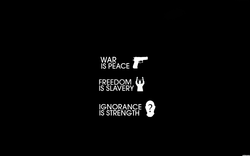
Whilst there are some aspects to Orwell’s character that may lend themselves to any number of mental disorders, (those obsessive compulsive lists and calculations in his domestic diaries that leaked into some of his essays) the more pertinent question is not whether Orwell and several other historical figures whose names are always dropped in these analyses, (Churchill, Hitler, Newton et al) are mentally ill but whether the human condition puts us all ‘on the spectrum’ of madness to one degree or another.
Obsessive Compulsive Disorder is seen as a person attempting to control their environment and ultimately their fate. When we are children and most of our environment feels completely out of our influence and affected by the large slow moving adults around us, we often display what psychologists might term typical OCD behaviours. ‘If I touch every single fencepost on the way home, Mummy will not discover the broken teapot I hid under the dresser and if I correctly guess kippers for tea, Daddy will not be killed by the Germans for I am the ruler of the universe and am in ultimate control of my fate’. As we grow up, these insecurities are subsumed by a growing confidence or suppressed to a degree that is manageable or, in the minority of cases, retained to be diagnosed by a man in a more expensive suit than we could ever afford for $140 an hour plus tax.
Orwell’s paranoia is also cited as another indicator. But how many of us can put themselves in the position of a writer who had already appeared on one death list during the Spanish Civil War and who believed by retreating to the remote Isle of Jura he might escape the worst effects of a third Atom Bomb explosion? Given the time in which he lived and his previous experiences, one might think it a healthy precaution to be ever so slightly paranoid about over-friendly strangers and high profile social situations.
The truth is, we may regard our response to the world, our environment and our immediate personal experiences as being ‘on a spectrum’ of response and behaviours that are shaped by formative episodes in our childhood or genetics or physical injury to the brain. These responses are over-characterised for conveniences sake by professionals who desire a scale against which these things can be weighed, measured and treated. I have never experienced an age where there has been such a desire to label people as suffering from Bipolar Affective Disorder. The reason? Because, helpfully, a list of heavily promoted drugs are listed against such a diagnosis and prevent your GP or mental health professional from having to think very deeply about the appropriate treatment for how you feel when in a temporary or intermittent period of intense stress, anxiety or depression. Far easier to see the recommended Pharmacopoeia choices available for such a diagnosis and prescribe them.
That is not to say that human beings with high levels of manic anxiety or depression do not genuinely benefit from a period (perhaps a long period) of medication to control the life-altering levels of pain and suffering caused by real and demonstrably disabling conditions. No one who has seen the distressing effects of delusional psychosis on the sufferer and their families would deny they need some chemical intervention to relieve their pain and stabilise their racing minds. But we have to be careful in a world dominated by Big Pharma not to become blind to the degrees along that human spectrum and allow a default position that can pathologise every aspect of human behaviour.
Reading and re-reading Orwell with a degree of intensity that may seem, dare I say, Obsessively Compulsive, I would conclude that during his time in Barcelona, on a death list and on the run from Fascist and Republican alike, I would have prescribed Lithium to bring down his manic tendency to believe that everyone is out to kill him with a side order of Zopiclone to help him with those sleepless nights. War is Peace. Freedom is Slavery. Ignorance is Strength. Mad is Sane.
 RSS Feed
RSS Feed